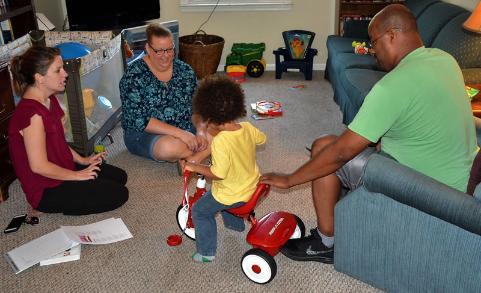Adult Learning and Early Intervention
 Recommended practices in early intervention strongly emphasize the importance of supporting caregiver learning throughout the EI process. EI service providers can use adult learning principles and practices during visits with families to help caregivers actively learn strategies they can use with their children to enhance development during daily activities.
Recommended practices in early intervention strongly emphasize the importance of supporting caregiver learning throughout the EI process. EI service providers can use adult learning principles and practices during visits with families to help caregivers actively learn strategies they can use with their children to enhance development during daily activities.
Adult learning principles can also be applied to professional development for EI service providers. Here you will find resources, such as articles, handouts, and other resources related to applying adult learning principles and strategies to early intervention service delivery and professional development.
Be sure to visit the Early Intervention Strategies for Success blog for many posts related to applying adult learning principles to early intervention service delivery. You’ll also find additional resources on coaching (an adult learning strategy) by visiting the Coaching in Early Childhood topic page on this site.
Available Resources
n/a
Six Early Intervention Adult Learning Principles (external website)
Brooked Publishing
Supporting the learning needs of caregivers is a fundamental part of early intervention practice. The 6 principles described in this infographic can guide your work with caregivers to ensure strong and productive relationships.
8 Concepts from Adult Learning You Can Use to Support Caregivers (external website)
TaCTICS
Florida State University
This handout describes eight concepts based on adult learning that apply directly to supporting and collaborating with caregivers during early intervention.
Adult Learning Theories (external website)
Teaching Excellence in Adult Literacy (TEAL) Center Fact Sheet No. 11
This fact sheet provides a brief overview of three main adult learning theories: andragogy, self-directed learning, and transformational learning.
The Adult Learning Theory – Andragogy – Infographic (external website)
eLearning Industry
This infographic provides a visual representation/overview of the five assumptions and four principles of the andragogy theory of adult learning.
Adult Learning Quik Reference Guide
This guide outlines five principles of adult learning and provides examples of how they can be applied when interacting with caregivers during EI visits. The guide also includes a checklist to help practitioners assess their practices related to adult learning.
An Evidence-Based Approach to Professional Development in Early Childhood Intervention (external website)
Carl J. Dunst, PhD
Orlena Hawks Puckett Institute
This presentation addresses research on the key characteristics of evidence-based practices for a participatory approach to professional development. Research on the PALS (Participatory Adult Learning Strategy) method is described.
Trivette, C. M., Dunst, C. J., Hamby, D. W. , O’Herin, C. E. (2009). Characteristics and consequences of adult learning methods and strategies. Research Brief Volume 3, Number 1. Tots n Tech Research Institute. (external website, pdf)
This article describes the findings of a research synthesis on four adult learning methods, including accelerated learning, coaching, guided design, and just-in-time training.
Friedman, M., Woods, J., & Salisbury, C. (2012). Caregiver coaching strategies for early intervention providers: Moving toward operational definitions. Infants & Young Children, 24, 62-82. (external website, pdf)
This article discusses underlying theories of adult learning that were used to develop a set of caregiver coaching strategies for use in early intervention.
Woods, J. J., Wilcox, M. J., Friedman, M., & Murch, T. (2011). Collaborative consultation in natural environments: Strategies to enhance family-centered supports and services. Language, speech, and hearing services in schools, 42, 379-392. (external website, pdf)
This article discusses recommended practices related to EI service delivery using a collaborative consultation approach. Family-centered service delivery, evidence-based intervention strategies, consultation and coaching, applying adult learning principles, and individualizing the EI process for adult learners are discussed in detail.
eLearning
Dunst’s (2015) 7 Key Features of Evidence Informed In-Service Professional Development
This short video was created on behalf of the Early Intervention-Early Childhood Professional Development Community of Practice. An overview is provided of Dunst's (2015) model of evidence-informed professional development.
Additional Resources:
- Source Article: Dunst, C. J., (2015). Improving the Design and Implementation of In-Service Professional Development in Early Childhood Intervention. Infants & Young Children, 28(3), 210-219.
- At-a-Glance: Key Features of the Evidence Informed In-Service Professional Development Model
- Reflective Activity: Implementing Evidence-Informed Professional Development Practices
Webinars
6 Adult Learning Principles Every Early Interventionist Should Know (external website)
Brookes Coffee Chat
This webinar provides an introduction to the six early intervention adult learning principles that service providers can use to support caregiver learning during visits with families. Strategies for implementing these principles during balanced intervention visits will also be highlighted.
N/A
N/A
N/A